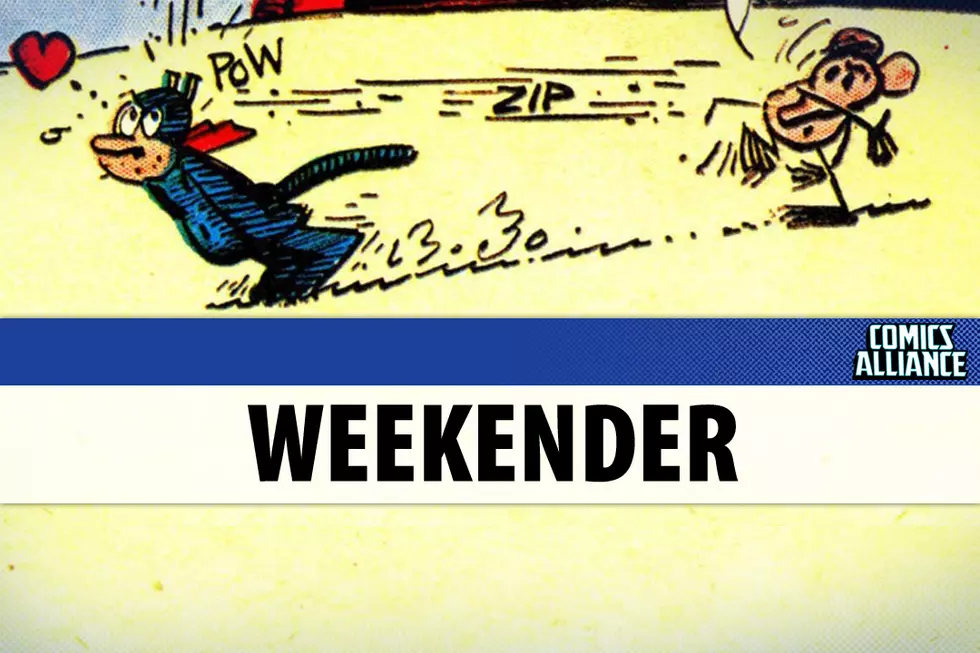
Storytelling, Comedy, Comics, And Film: A Career-Spanning Conversation With Berkeley Breathed
Ever since Bloom County became a sensation in the early '80s, Berkeley Breathed has had an incredibly varied career. He followed Bloom County's initial success with two more popular comic strips, Outland and Opus; he won the 1987 Pulitzer Prize for editorial cartooning; he wrote and illustrated best-selling children's books; he adapted his own stories into a pair of animated TV specials, and he provided art for various environmental and animal-welfare charities.
In recent years he's shifted his primary focus to film (production art and original projects), while also overseeing IDW's comprehensive collected editions of his strips. He recently teamed with IDW again for Berkeleyworks, a retrospective volume collecting a number of his paintings, sketches, and illustrations – and last month, he made a rare convention appearance, playing to a packed room at San Diego Comic-Con. ComicsAlliance spoke with Breathed about his career in cartooning, his work in other media, and his upcoming projects.
ComicsAlliance: You mentioned at San Diego that you weren't originally a huge fan of comic strips, so how did you become a cartoonist?
Berkeley Breathed: I'd been fired as a photographer from the student newspaper at the U of Texas. Since I couldn't resist making facts up in news stories, the cartooning desk was the final option.
CA: Was there a point where you decided (or realized) that this seemed to be turning into an actual profession – something you could do and make a decent living?
BB: When I paid for my yearly expenses in my junior year with the sales of the crappy little collection of my cartoons, it dawned on me that there might be a living out of it. If this hadn't happened, I'm quite convinced I'd be a barista at Starbucks at this very moment.
CA: One of the trademarks of Bloom County was your willingness to take on public figures and corporations. You parodied ad campaigns, mocked celebrity endorsements, clowned political figures, poked fun at supermarket tabloids… How did you manage to get away with all that?
BB: It was shocking only because the internet had yet to be invented. The first few letters from corporate lawyers demanding – at least – that I put a copyright and trademark symbol after any mention of "Whopper" were the first I ignored. My editors panicked. They got used to it.
CA: It also seemed that the more outrageous you got, the more popular the strip became – it certainly drew a new kind of attention to the comic section. Doonesbury also tackled current events, but it was generally placed in the style or editorial section, while Bloom County was right in the middle of the "funny pages," shaking up a domain normally reserved for Family Circus and Rex Morgan. Were there moments where you came into conflict with the syndicate in regards to what you could say or do?
BB: They were too busy being shocked that they were getting such huge money. This was the Washington Post Syndicate. They didn't have any other strips in more than 20 newspapers. They're still wondering what lightening bolt hit them.

CA: Looking back, were there any moments where either you feel you you went too far, or that you didn't push far enough?
BB: Moments of creative regret are hard to avoid but better ignored. I'm more astonished that I gave so much attention to those who didn't merit it. Michael Dukakis?
CA: Within a few years of starting, Bloom County became a bonafide cultural phenomenon. You won a Pulitzer Prize, the book collections were bestsellers, and then there were T-shirts, coffee mugs, and stuffed animals. Was there any one thing, or one moment, which made you realize how big it had got?
BB: The funny thing is that it didn't get as "big" as people think. I never got in the number of papers that the giants were in. On any given day, the readership of The Family Circus was probably bigger. Couldn't touch Garfield.
It got the attention, though, of the people who bought books and t-shirts and wrote the articles. The readership was relatively narrow … but very, very intense and loyal and protective. Classic cult characteristics. Calvin & Hobbes had both worlds. Quite a trick.
CA: Opus dolls seemed almost like another gag at first, a ridiculous response to the inescapable stuffed Garfields – but they ended up becoming a sensation in their own right. Did you ever have any concerns about Bloom County becoming the sort of over-commercialized property that you so vigorously lampooned?
BB: It ran a fine balance. I didn't pretend that I could manage it. I knew that it was weirdly more obnoxious – and presumptuous – to declare yourself above merchandising than to actually do it. An odd oxymoronic situation.
[Bill] Watterson's toxic relationship to the idea of a Hobbes doll – given the business he was in – is intriguing. But also dangerously close to perceived self-importance. That's a killer for me. We aren't important at all. It's all just fun, and the moment we think it's more it all goes up and disappears, like smoke.
CA: You've worked with a number of non-profits and causes over the years, doing art for The Humane Society, the ASPCA, PETA, and the Sea Shepherd Society among others. Did those organizations approach you, or did you seek out the causes you felt strongly about?
BB: Both. Animal welfare is a natural. And it's an easy cause without complicating contradictions. My kind of activism.
CA: It's not a stretch to say that Opus is your most popular and well-known character, but you've said that he was originally intended to just be the set-up for a week or so of gags. Why did you decide to keep him around?
BB: Even before email, and in a roach infested apartment in Iowa, I could sense the reaction. I got actual letters in those days. The reaction was immediate. The only thing I knew is that if I'd tried to get that reaction, I'd have failed. Everything about my career and the particulars of the strip has been accidental.
CA: So have you ever had a moment where you created a character and immediately thought "this is the one"; that you'd come up with a particular crowd-pleaser?
BB: Nope. Bill the Cat was a one week throw-away gag to lampoon Garfield. Go figure.
I did plenty of characters that never went anywhere. We all did.
CA: The original 'Billy & The Boingers Bootleg' collection contained a flexidisc with a pair of tracks "by the band." Did you have any hand in writing or recording those songs?
BB: They were found in a Call to Music that I announced in the strip.
Thousands of tapes arrived. I could only listen to a tiny portion. They were the funniest.
CA: Once Bloom County wrapped, you transitioned almost immediately into doing Outland – which started out as a whole separate world, but ended up running off in its own direction, incorporating characters like Bill and Opus, and following up threads from Bloom County. Was that the plan from the get-go, or did it just develop naturally as it went on?
BB: Artists – especially musical artists – universally assume that their fans will follow wherever they go as they start exploring. Wrong. We all get bitch-slapped by the fussiness of our original fans. Then we have only one response: humility. And thankfulness that we have fans at all. Please them. The popular art world isn't about pleasing yourself, despite the blather that it is.
CA: After Outland, you spent eight years away from newspapers, before returning with Opus, which ran from 2003-2008. You'd established a second career for yourself as an author and illustrator of children's books, so what made you want to return to comics?
BB: Missed the voice. I knew the door was closing, culturally, but I wanted to have a little fun before it shut. Which it did.
CA: So far as picture books go, are there any creators you'd cite as particular inspirations?
BB: I was only influenced by Chris Van Allsburg. Funny, because he wasn't funny. But his drawings inspired me to draw better. I added the humor he avoided and voila!
CA: You've done film work, comics, prose, picture books. Does working in different mediums satisfy different creative urges?
BB: Storytelling is my calling. The comics satisfied that in a small way. The picture books were only ways to tell a story better told in moving pictures. Nearly all the books were simply storyboards for TV or movies. Nearly all were sold to get developed for that.
The stories I think of now bypass books entirely, and the drawings simply are used to sell them as films. That's how I work.
CA: One of the things I appreciate most about your cartoons is your sense of comedic timing: setting up a gag, giving yourself the space to deliver it perfectly, and hitting the right beats. Who would you consider to be comedic influences?
BB: My friend John Cleese knows precisely how to structure set up, hook and punchline. And he helped me learn that comedy is not about the dialogue. It's the idea. It's the set up. It's the situation. I actually hate writing lines of dialogue and trying to make them funny. Ratatouille is the funniest animated film I've ever seen … and not a single great laugh came from a delivered line. When a health inspector comes to inspect a restaurant, opens the door and sees several hundred rats in the kitchen doing the cooking – and they all stop to look at him – well, the last thing you should do is ruin that moment with a spoken line.
CA: You've partnered with IDW to release the complete Bloom County, Outland, and Opus editions... Is it true that editor Scott Dunbier sought you out? Were you familiar with IDW before that point?
BB: Never heard of them. Scott Dunbier is a gift to the comics world. I turned him down flat, as I was far too lazy to do the massive work of collecting the 6000 comics that were strewn around my house and the planet. He did it all and told me to relax with an iced tea.
CA: Were there any particular surprises that came up while working on the Complete Editions?
BB: It was a surprise that so much of Bloom County wasn't as strong as I would have liked. I hadn't read most of it for 25 years. I'd only known what we'd chosen for the small collections each year. Which was the strongest material of course.
You can tell why the PR folks at my publishers don't like me talking to the press.
CA: You've also published an art retrospective, Berkeleyworks, through IDW. How did that project happen?
BB: Scott Dunbier was behind all of it. He's a machine. I hate him because he's got the purest heart of anyone in the business which makes the bastard impossible to turn down.
CA: And it was mentioned at SDCC that you've been talked into doing a collection of your pre-Bloom County strip, Academia Waltz?
BB: Talk to Scott. This is the worst idea in the history of career-ending ideas. None of that material should ever be seen. I urge everyone reading this to avoid that book like Ebola. It makes the word "politically incorrect" pale into insignificance. I was 19 when I drew those offensive characters. I was treating the comic page like a kid discovers and treats his genitals at age 13.
CA: Do you have plans for more projects with IDW in the future?
BB: Scott would like to make a collection of my footprints in sand. That's all that's left. He'll do it.
CA: And what's next? More picture books? More film work? Retiring, and sitting on a tropical beach?
BB: I'm a movie baby now, for better or worse. It's where I wanted to be at 18 before I got sidetracked for 30 years, dammit. One of my books got made into a massive catastrophe a few years ago from Disney. I am now working to reverse that legacy...
See you on the big screen.
More From ComicsAlliance









